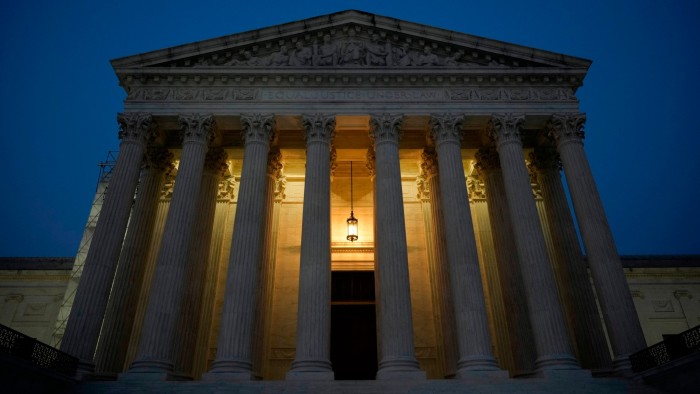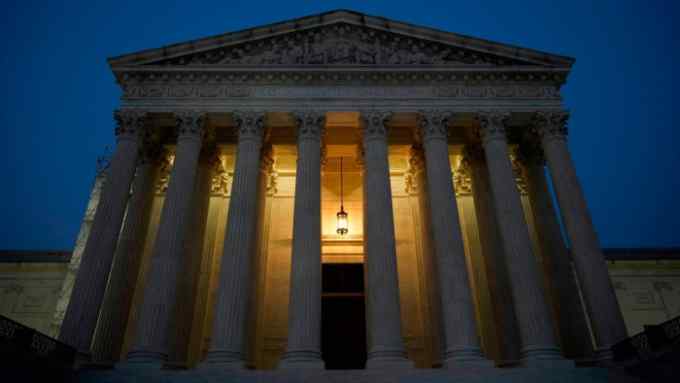US Supreme Court cases risk weakening standards


Roula Khalaf, Editor of the FT, selects her favourite stories in this weekly newsletter.
The writer is the FT’s US financial editor
Like most countries, the US relies heavily on regulators to handle the day-to-day business of governing. Congress has neither the time nor, in recent years, a cohesive majority willing to tackle the complexities of overseeing everything from securities and fisheries to guns and pollution.
But all that could be about to change, in ways that would be very destabilising for business. Judicial conservatives who believe less government is better than more have long had what is known as “the administrative state” in their sights. Now, the Supreme Court’s rightwing majority is poised to inflict major damage to the way the US government has been working for four decades.
Four cases are attracting particular attention. They focus on methods for agency funding, the use of administrative law judges in some regulatory proceedings, and, most prominently, the ability of agencies to determine the rules in areas where Congress has not given detailed instructions.
If the most conservative interpretations win out, the cases could undermine the financial independence of the US Federal Reserve, change the way the US Securities and Exchange Commission brings many enforcement cases, and cause what the Biden administration warns would be a “convulsive shock” to the American legal system.
Industry challenges to US regulations are already proliferating, and these cases could lead to more. “All the big-ticket rules absolutely are going to end up in court,” says David Slovick, a former senior enforcement attorney at both the SEC and the Commodity Futures Trading Commission.
“The conservatives see this as an opportunity to remake the legal landscape for a generation.”
Progressives who support tough regulation of business are most concerned about two cases that focus on, of all things, fishing fees — specifically, the right of a federal agency to make fishermen pay to be monitored.
The Supreme Court justices have made clear that they intend to use Relentless vs Department of Commerce and Loper Bright Enterprises vs Raimondo to reconsider a seminal decision that has set the rules for legal challenges to federal regulation since 1984. Under the Chevron doctrine, as it is known, courts defer to an agency’s interpretation of federal law when Congress itself has been silent.
Lauded by conservative Antonin Scalia as a way to defend Republican agency policies from liberal legal challenges, Chevron is now a bête noire of rightwingers who believe it gives administrators, particularly Democrats, too much leeway. “The conservative lawyers and the conservative justices believe that the final word on what a law means is the court, not an administrative agency,” Slovick says. “It’s about control.”
Anti-regulatory groups such as the conservative Federalist Society crave a wholesale rewriting that would give the courts more power to check regulators, including the Environmental Protection Agency and the SEC.
But Don Goodson, a senior attorney at New York University’s Institute for Policy Integrity, warns that businesses should be careful what they wish for.
“There are good legal reasons for Chevron and there are good practical reasons . . . Inevitably, federal statutes are sometimes ambiguous,” he says.
If different courts reach different conclusions, that could lead to conflicting rules in various parts of the country. “If you are a regulated entity, the question is: do you want one interpretation or several? That may have headaches of its own,” he adds.
Financial services groups have long complained that the SEC’s use of in-house administrative law judges, in some enforcement cases, essentially allows it to act as both prosecutor and judge. Supporters argue the process facilitates swift action and saves court time. They also note that decisions can be appealed to the circuit courts.
But hedge fund founder George Jarkesy contends that the use of an administrative law judge to hear his securities fraud case against the SEC deprived him of his constitutional right to a jury trial, an argument that taps into the current majority’s scepticism of administrative proceedings. The key question will be whether the majority rules in a way that would affect enforcement proceedings — not just at the SEC but a wider range of federal agencies.
The funding case is perhaps the most radical of all. It arises from the latest legal challenge to the Consumer Financial Protection Bureau (CFPB), which was created to protect customers after the 2008 financial crisis and has been under attack ever since. The plaintiffs contend that the agency is unconstitutional because its funding comes from the Fed’s operating budget, rather than an annual Congressional appropriation.
The case initially went to the Fifth Circuit appeals court, known for its staunchly rightwing judges. Their decision in October 2022 used such sweeping language that it could be interpreted as invalidating not just the CFPB but also the independent funding methods applied to Medicare, Social Security and the Fed.
But, when the Supreme Court heard oral arguments this autumn, even some of the conservative justices seemed sceptical of that interpretation. “The Fifth Circuit is going farther than the Supreme Court is willing to go,” Goodson says. “The court, even though it has drifted to the right, doesn’t want to overshoot and undermine the Federal Reserve.”
Many businesses may find this anti-regulatory agenda appealing now. But, ultimately, they may regret decisions that substantially weaken independent monetary policy and national standards.
This article has been amended to clarify that while Antonin Scalia lauded the Chevron doctrine, he did not write the ruling as originally wrongly stated.

Comments